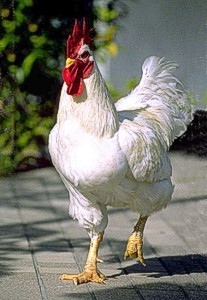Avian Influenza

Avian influenza (often referred to as bird flu) is a virus that affects bird populations. There are many different strains of avian influenza that cause varying degrees of illness in birds.
The most common types of avian influenza are routinely detected in wild birds and cause little concern. Highly pathogenic strains of avian influenza are of greater concern because they are easily spread among birds and are typically deadly to domesticated poultry.
Reporting Sick or Dead Farm Birds
If domestic poultry or other farm birds exhibit signs of avian influenza (ranging from sneezing, coughing and ruffled feathers to sudden and high numbers of bird losses), bird owners should consult their local veterinary professional and notify state or federal animal health officials.
Nationally, sick or dead farm birds can be reported to USDA toll-free at 1-866-536-7593, or in Tennessee, contact the State Veterinarian’s Office at 615-837-5120.
Receive Bird Health Updates
The Word on Birds is an email service to inform Tennessee bird owners of health threats to backyard poultry flocks and pet birds. Enroll here.
News Updates
Feb. 1, 2023 - Weakley County Control Zones Update
Jan. 20, 2023 - Highly Pathogenic Avian Influenza Detected in West Tennessee Poultry Flock
Dec. 15, 2022 - Avian Influenza Detections Lead to Launch of New Service
Nov. 30, 2022 - State Veterinarian Urges Biosecurity to Prevent Highly Pathogenic Avian Influenza
Nov. 28, 2022 - Waterfowl and Wild Bird Precautions for Avian Influenza
Nov. 15, 2022 - Highly Pathogenic Avian Influenza Cases Increase in Tennessee
Oct. 5, 2022 - State Veterinarian Lifts Poultry Restrictions
Sept. 15, 2022 - Highly Pathogenic Avian Influenza Detected in Tennessee
Feb. 14, 2022 - Virus Deadly to Poultry Detected in Kentucky Flock
HPAI Response Policies and Guidance Meeting Videos
Avian Influenza Response Links
- HPAI New State Checklist (usda.gov)
- USDA APHIS | Highly Pathogenic Avian Influenza (HPAI)
- USDA APHIS | Producer Indemnity and Compensation
- HPAI Response: Overview of Finance & Administration Procedures (usda.gov)
- USDA Commercial Indemnity Table, 2023
- Cleaning & Disinfection Basics (Virus Elimination) (usda.gov)
- Permitting Live Poultry into an Infected Zone: Claims for USDA Indemnity Not Considered
- https://poultrybiosecurity.org/
- https://www.aphis.usda.gov/animal_health/emergency_management/downloads/hpai/permittingprocess.pdf
- USDA-HPIA infographic_REV9.16fin+poultry (fdlp.gov)
Avian Influenza Frequently Asked Questions
Per USDA’s definition, poultry is any domesticated bird used for food. That includes chickens, doves, ducks, geese, grouse, guinea fowl, partridges, pea fowl, pheasants, pigeons, quail, swans, and turkeys.
It depends.
Movement of poultry within the 10k (6.2 miles) control zone surrounding the affected premises is restricted and requires permitting until the zone is released.
If you own poultry outside the control zone, private, person-to-person sales are allowed.
Keep in mind that movement of domesticated birds is risky with highly pathogenic avian influenza (HPAI) circulating in our environment. We always recommend isolating new birds for at least two weeks before introducing them to a flock and that’s especially important during a disease outbreak.
If you are bringing poultry into Tennessee from any other state or country at any time, movement documents are required. Learn more here: www.tn.gov/agriculture/businesses/animals/animal-health/import.html
The current requirements apply to all flock owners, regardless of NPIP status.
We do encourage enrollment in the National Poultry Improvement Plan, the Secure Broiler Supply Plan, and the Secure Egg Supply Plan as appropriate for your operation. Participation in these programs helps to avoid supply chain interruptions and benefits everyone connected to the poultry industry.
As long as the store is not within the control zone, farm stores can sell chicks.
HPAI is deadly for domesticated fowl. If chicks are exposed to HPAI, they will die rapidly. Therefore, chicks that are alive and active are likely healthy.
Animal Health staff members are visiting poultry owners in-person within the control zone to explain the situation, answer questions, and provide information. If you have concerns about your location, please contact our office and we will help determine if your flock is within the zone. Email Animal.Health@tn.gov or call 615-837-5120.
All birds are susceptible to HPAI, although some species are more susceptible than others. The disease is especially deadly for chickens and turkeys. Parrots, parakeets, and other psittacines are not poultry but are susceptible to avian influenza. Infection among psittacines does not impact international trade because they are not considered poultry. Sales of parrots and parakeets at livestock markets, flea markets, and swap meets are at the market’s discretion. Market managers should contact TDA if they need guidance or clarification.
Avian influenza is not spread by cooked food. There is no evidence to suggest that eating properly cooked poultry or eggs could transmit the virus to humans.
HPAI does not pose a food safety risk. However, out of an abundance of caution, no infected poultry will be allowed to enter the food supply.
Resources for Poultry Owners
USDA APHIS: Avian Influenza
USDA APHIS: Defend the Flock Resource Center
CDC: Birds Kept as Pets
CDC: Healthy Poultry, Healthy People
USDA APHIS: Understanding the Response Process
UT Extension: Avian Influenza
Information for Consumers
Avian influenza viruses do not normally infect humans. However, sporadic human infections with avian influenza viruses have occurred.
Guidance from the Centers for Disease Control and Prevention:
• As a general precaution, people should avoid wild birds and observe them only from a distance, avoid contact with domestic birds that appear ill or have died, and avoid contact with surfaces that appear to be contaminated with feces from wild or domestic birds.
• People who have had contact with an infected bird or birds should monitor their own health for possible symptoms of illness.
• There is no evidence that any human cases of avian influenza have ever been acquired by eating properly cooked poultry products.
American Veterinary Medical Association: Avian Influenza and Companion Animals
Partners & Programs
Tennessee Poultry Association
U.S. Poultry & Egg Association
National Poultry Improvement Plan
Secure Broiler Supply Plan
Secure Egg Supply Plan